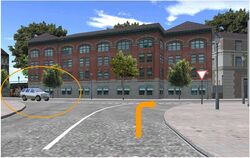
Drivers of Speed Choice on Urban Roads - Interaction between Human Factors and the Traffic Situation

How individual drivers choose and maintain their speed in the presence of other road users is a key factor in cooperative urban road traffic management. Speed choice as core aspect of driver behaviour is mainly determined by automatic responses to specific environmental stimuli (e.g. road width, curvature), personality traits (e.g. sensation seeking), and situational factors (e.g. time pressure). However, it is unclear to what extent information from an intelligent cooperative traffic system, e.g. on current traffic hazards or environmental aspects, would be considered by drivers and how this additional information would be integrated with the more automatically processed information.
Driving simulation studies are conducted to examine these factors as well as the interaction between them by systematically varying and combining relevant driving scenarios. This way, a model of speed choice can be developed that is relevant to both the modelling of distributed intelligent and cooperative systems (B2) and the cooperative traffic management. Cooperative management applications may use the results of this dissertation to develop information displays that are most effective in influencing driving speed in the desired manner. By predicting driver behaviour, the model may also serve as a transport planning tool (B1).
Researcher: Anne Goralzik, M.Sc.
Student Research Projects
2015
Speed control in on-road and simulated driving (Carrie Geng, DAAD RISE)